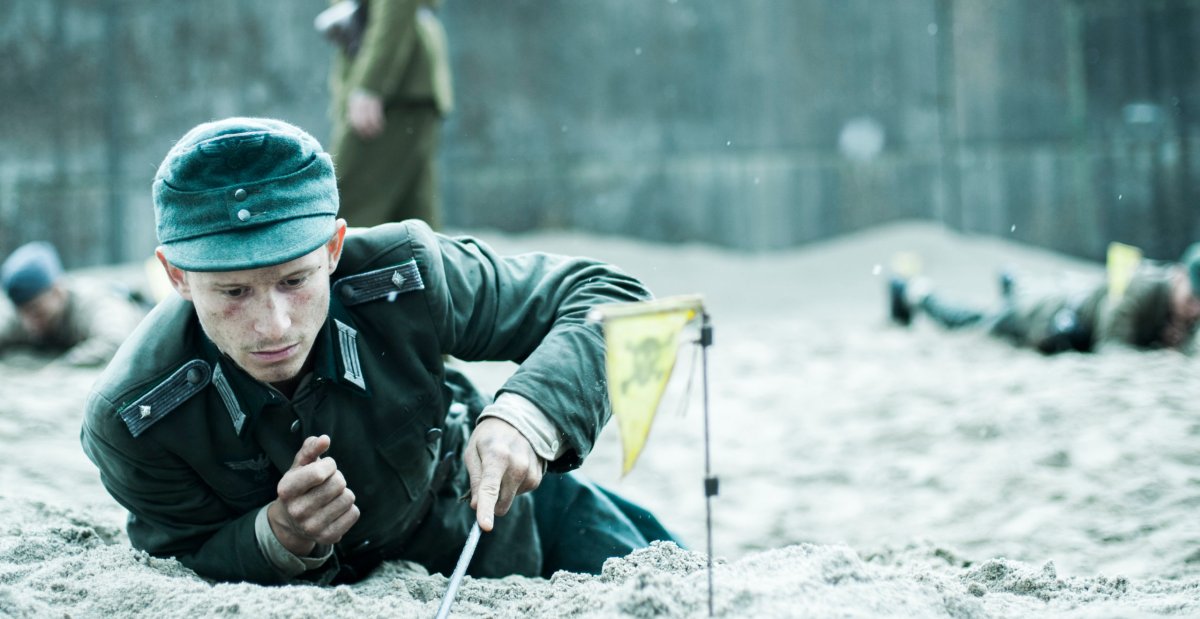‘Land of Mine’ You know who had it rough after World War II ended? The Germans. We kid, we kid. Even the worst of humankind deserves empathy, a point the drama “Land of Mine” argues convincingly, if not always artfully. Presently nominated for a Foreign-Language Film Oscar, it arrives on American shores as decent members of our species, those who would never condone violence, can’t help but squee as Richard Spencer is repeatedly punched in his evil, white supremacist face. Meanwhile, here’s a movie that assigns itself the tough task of humanizing people most would agree deserve their hate: Nazis. The opening is downright Spencerian: It’s May 1945, and Danish sergeant Carl Leopold Rasmussen (Roland Moller) stops his jeep to behold the sight of Axis soldiers marching out of his newly freed country. “Get lost!” he shouts, puncturing his taunts with kicks to their behinds. When one shows him a tiny bit of lip, he beats his face into a bloody pulp. It feels good. But like most such outbursts, the rush is transitory, the fall-out caked with shame. The story quickly shifts to the other side, specifically a platoon of young German POWs who aren’t going home right away. First, they’ve been enlisted, as part of the peace treaty, with defusing a chunk of the 2.2 million landmines their nation planted along the Danish coast. Rasmussen is their whipping master, assigned to oversee a mission that will take some three months to complete. His hate hasn’t subsided, and he takes great pleasure in screaming at these petrified kids, locking them up at night in a dingy shack. He denies them food and water and takes great pleasure in informing them, point blank, that he doesn’t care if any of them get blown to smithereens. RELATED: Your guide to the Academy Award-nominated shorts, to help you with your Oscar pool The early stretches of “Land of Mine” promise a lot. Apart from unearthing yet another obscure and rich sliver of World War II history, it will portray how prejudice infects both the prejudiced and their prejudicees. Rasmussen will come to feel as hollow, alone in his fury, as the soldiers themselves, who live every second made to feel less than human for fighting for a nation that did the same to others on a grander scale. Still, they are just boys. These aren’t the ecstatic Hitler Youths of the war’s peak; these are kids roped into service in the 11th hour, as Nazi Germany was on the wane. None of them speak about ethnic cleansing or nationalist might; to their country, they’re simply statistics, bodies thrust into battle, then punished for the crimes of their overlords. Once you get that, though — which is to say fairly quickly — you get your fill of “Land of Mine.” There’s still the rest of the movie to go. Unsure how to tie this up, this tough and brutally honest drama turns soft. The fiery Rasmussen warms to his young charges, plays football with them on the beach, defends them from drunken colleagues, who’ve turned into one-note monsters picking on poor German soldiers. Later the film will goose the audience in the cheapest ways possible: by killing a dog, even putting a little girl in harm’s way. When you’ve targeted animals and kids, you know you’ve run out of ideas. Even one of the film’s best traits softens into a lump: The early scenes of landmine finding and defusing run sick with tension — soldiers crawling on beaches, gently sticking poles into the sand, then gently, nervously removing the part that makes the bombs go boom. Initially Martin Zandvilet films these quietly, using silence to fray audience nerves. Eventually he’s had enough of this, instead draping scenes of inspection and, occasionally, destruction in a chocking fog of sad music. He even includes the anti-classic scene where characters casually jabber about what they’re going to do when they get home, all but prompting us to cover our heads for a big explosion. It’s a well-intentioned movie that winds up favoring sentimentality over genuinely disturbing introspection. All you’re left with is a distant memory of when things were good, as well as the belated realization that the English-language title is a teeth-grinding play on words. Follow Matt Prigge on Twitter @mattprigge
Director: Martin Zandvliet
Stars: Roland Moller, Mikkel Folsgaard
Rating: R
2 (out of 5) Globes
‘Land of Mine’ is a rich World War II drama that turns soft

Sony Pictures Classics


















